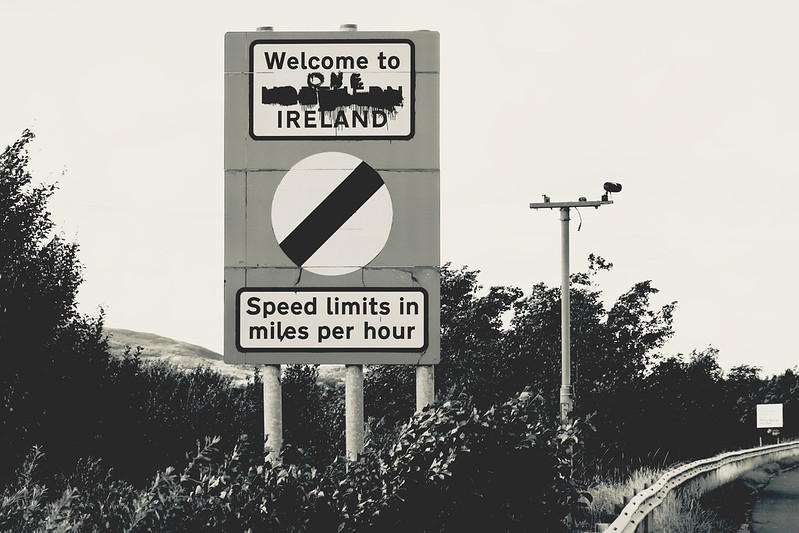The United Kingdom’s exit from the European Union and the EU’s single market system introduced a need for a customs border on the island of Ireland, since the Republic of Ireland remains an EU member.[1] Given the history of violent conflict over a hard border between the Republic of Ireland and Northern Ireland, a unique solution was needed to avoid a hard border at all costs.[2] The Northern Ireland Protocol became this solution by avoiding a hard border consistent with the objectives of the 1998 Good Friday Agreement, and instead created an Irish Sea customs border at Northern Ireland ports for goods entering Northern Ireland from the UK or any other country except Ireland.[3]
Since the Protocol went into effect at the start of 2021, disagreements about alterations to the Protocol have become prevalent between the UK and the EU.[4] In March 2021, the EU brought legal action against the UK for unilaterally extending grace periods for a portion of the protocol, but the EU dropped its legal action in July 2021 after the UK agreed that all other grace periods would remain untouched.[5] In July 2021, the UK called for renegotiations to the Protocol specifically concerning customs procedures and the governance of disputes by the EU’s Court of Justice.[6] The EU responded to the renegotiation calls in October 2021 when it proposed greater flexibility in custom checks for goods that won’t leave Northern Ireland with the condition of robust monitoring and increased surveillance to ensure the integrity of the EU single market.[7] In the proposals, the EU did not make any reference to the role of the EU’s Court of Justice as the final arbiter of disputes.[8]
The UK and EU held renegotiation discussions in February 2022, but the UK rejected the EU’s October 2021 proposals claiming they would make the UK’s situation worse.[9] The lack of progress in discussions resulted in the UK introducing a bill in June 2022 called the Northern Ireland Protocol bill.[10] The bill passed the House of Commons and currently sits in the House of Lords.[11] The bill would unilaterally change key aspects of the Protocol, and its primary objective is to create green and red lanes for goods imported into the Northern Ireland.[12] Goods traveling on the green lane would be exempt from customs checks, while goods traveling on the red lane would still undergo full customs checks.[13] The UK argues this change would simplify customs procedures by removing unnecessary costs and paperwork for businesses.[14] The bill also aims to change the dispute resolution body of the Protocol from the EU’s Court of Justice to an independent arbitration body.[15] With the introduction of the bill, the UK government published a policy paper arguing that the bill does not violate international law because of the doctrine of necessity which provides a legal basis for a country to not comply with an international obligation when non-compliance is the only way to safeguard an essential national interest.[16]
In June 2022, in response to the Northern Ireland Protocol bill, the EU resumed their previously suspended March 2021 legal action against the UK for the UK’s unilateral act of extending grace periods.[17] The EU also brought new legal action against the UK over their alleged failure to properly build and staff Northern Ireland customs ports and failure to provide data on the movement of goods.[18] The EU claims that the unilateral overriding of parts of the Protocol would violate international law because the UK would be breaking an international obligation.[19] Although the bringing of legal action suggests the time for discussions is over, the Vice-President of the European Commission, Maroš Šefčovič, emphasized the EU’s willingness to continue negotiations and stressed that their October 2021 proposals are “oven-ready.”[20] These legal actions do not directly address the UK’s Northern Ireland Protocol bill, but Šefčovič has said that the EU reserves the right to take further legal action if the bill ever becomes law.[21]
The movement of the Northern Ireland Protocol bill through the UK Parliament will be critical to determine the outlook of the UK and EU’s relationship in the coming months. The existing EU legal action, under the jurisdiction of the EU’s Court of Justice, will likely take years to be resolved.[22] If the bill becomes law, the EU could turn to impose trade sanctions against the UK which could trigger a trade war.[23] A UK and EU trade war could involve putting up barriers to the exchange of goods which would have negative effects on the British, Irish, and European economies which are already struggling with inflation.[24] A compromise between the UK and EU on alterations to the Protocol would avoid the potentially disastrous consequences of a trade war and would be in the best interest of all parties involved.
[1] See Tom Edington, Brexit: What is the Northern Ireland Protocol? bbc (Oct. 27, 2022), https://www.bbc.com/news/explainers-53724381.
[2] See id.
[3] See The Protocol on Ireland and Northern Ireland Explained, European Council (Oct. 12, 2022), https://www.consilium.europa.eu/en/policies/eu-relations-with-the-united-kingdom/the-eu-uk-withdrawal-agreement/the-protocol-on-ireland-and-northern-ireland-explained/.
[4] Edington, supra note 1.
[5] See Iain McIver, How the Disagreement Over the NI Protocol has Affected EU-UK Relations, Scottish Parliament Information Centre (June 16, 2022), https://spice-spotlight.scot/2022/06/16/how-the-disagreement-over-the-ni-protocol-has-affected-eu-uk-relations/.
[6] Id.
[7] See id.
[8] Id.
[9] See Jessica Parker, EU Takes New Legal Action Against UK Over Post-Brexit Deal Changes, bbc (June 15, 2022), https://www.bbc.com/news/uk-politics-61809459.
[10] McIver, supra note 5.
[11] Northern Ireland Protocol Bill 2022-23, HL Bill [52] (Gr. Brit.) https://bills.parliament.uk/bills/3182.
[12] Edington, supra note 1.
[13] Id.
[14] See McIver, supra note 5.
[15] Id.
[16] See Foreign, Commonwealth, & Development Office, Northern Ireland Protocol Bill: UK Government Legal Position, Policy Paper, 2022-23, HL 52, (UK) https://www.gov.uk/government/publications/northern-ireland-protocol-bill-uk-government-legal-position/northern-ireland-protocol-bill-uk-government-legal-position.
[17] McIver, supra note 5.
[18] Id.
[19] See Parker, supra note 9.
[20] Id.
[21] Id.
[22] See Jessica Parker, EU Launches Fresh Legal Action Over Northern Ireland Border Rules, bbc (July 22, 2022), https://www.bbc.com/news/uk-politics-62265810.
[23] See Id.
[24] See Parker, supra note 9.


